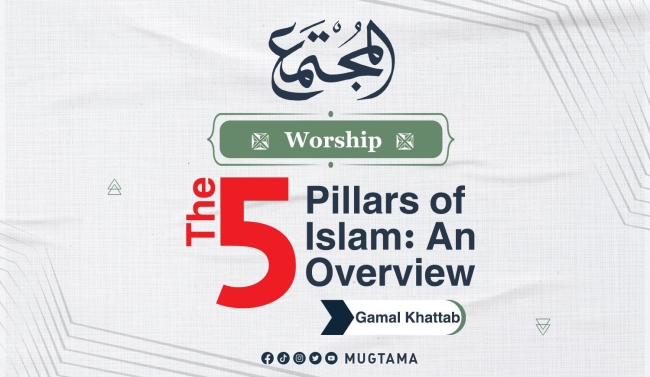Islam, one of the world's major religions, is guided by the teachings of the Qur'an and the Sunnah (the sayings and actions of the Prophet Muhammad, peace be upon him). The core principles of this faith are encapsulated in the Five Pillars of Islam. These pillars form the foundation of a Muslim's belief and serve as a guide for leading a righteous and fulfilling life. In this essay, we will explore each pillar in detail and provide evidence from the Qur'an and Sunnah that supports their significance.
- Shahada (Faith):
The first pillar of Islam is Shahada, or the declaration of faith, which calls for the belief in monotheism. It states that "There is no god but Allah, and Muhammad is His messenger." This proclamation symbolizes the Muslim's submission to Allah and acceptance of Muhammad as the final prophet. The Qur'an emphasizes the importance of Shahada in Surah Al-Baqarah (2:163), stating that, "Your god is one God, so submit to Him," acknowledging Allah's oneness and unifying all Muslims under a single faith.
- Salah (Prayer):
Salah, or the ritual prayer, is an act of worship that Muslims perform five times a day. It is a means of expressing gratitude, seeking forgiveness, and strengthening the bond with Allah. The Qur'an repeatedly highlights the significance of prayer throughout various verses, such as Surah Al-Baqarah (2:45), where Allah instructs believers to "establish prayer and give zakah." Similarly, Sunnah provides authentic narrations of the Prophet Muhammad emphasizing the importance of regular prayer, stating that "The first thing that a person will be questioned about on the Day of Judgment is his prayer."
- Zakat (Charity):
Zakat refers to the obligatory almsgiving, where Muslims donate a portion of their wealth to the less fortunate in society. It is not only a means of purifying one's wealth but also a way of practicing empathy, compassion, and social justice. The Qur'an frequently encourages the act of giving generously, exemplified in Surah Al-Baqarah (2:177), which states, "It is not righteousness that you turn your faces toward the east or the west, but [true] righteousness is [in] one who believes in Allah." Moreover, there are several instances in the Sunnah where the Prophet Muhammad emphasized the importance of Zakat, asserting that "Charity does not decrease wealth."
- Sawm (Fasting):
Sawm, or fasting, is observed during the holy month of Ramadan, wherein Muslims abstain from food, drink, and other physical desires from dawn until sunset. Fasting serves as a means of self-discipline, spiritual purification, and empathy towards the less fortunate. The Qur'an mentions the significance of fasting in Surah Al-Baqarah (2:183), stating, "O you who have believed, decreed upon you is fasting as it was decreed upon those before you, that you may become righteous." Moreover, Sunnah provides multiple instances where the Prophet Muhammad endorsed fasting, affirming that "Whoever fasts in Ramadan out of sincere faith and hoping for a reward from Allah, all his previous sins will be forgiven."
- Hajj (Pilgrimage):
The fifth and final pillar of Islam is Hajj, the pilgrimage to the holy city of Mecca, which every financially and physically capable Muslim is obliged to perform at least once in their lifetime. It serves as a unifying experience, bringing Muslims from diverse backgrounds together in worship and remembrance of Allah. The Qur'an explicitly addresses the significance of Hajj in Surah Al-Baqarah (2:196), stating, "Hajj is [during] well-known months, so whoever has made Hajj obligatory upon himself therein [by entering the state of ihram], there is [to be for him] no sexual relations and no disobedience and no disputing during Hajj." Furthermore, there are numerous narrations from the Sunnah that outline the rituals and practices of Hajj as performed by the Prophet Muhammad.
The Five Pillars of Islam provide a comprehensive framework for Muslims to follow in their daily lives. Each pillar holds immense significance and serves as a means of strengthening one's faith, fostering a sense of community, and seeking Allah's pleasure. The Qur'an and Sunnah provide ample evidence reinforcing the relevance and importance of these pillars, offering clear guidance for Muslims across the globe. By adhering to the Five Pillars, Muslims can strive to lead a righteous and fulfilling life in accordance with their faith.


